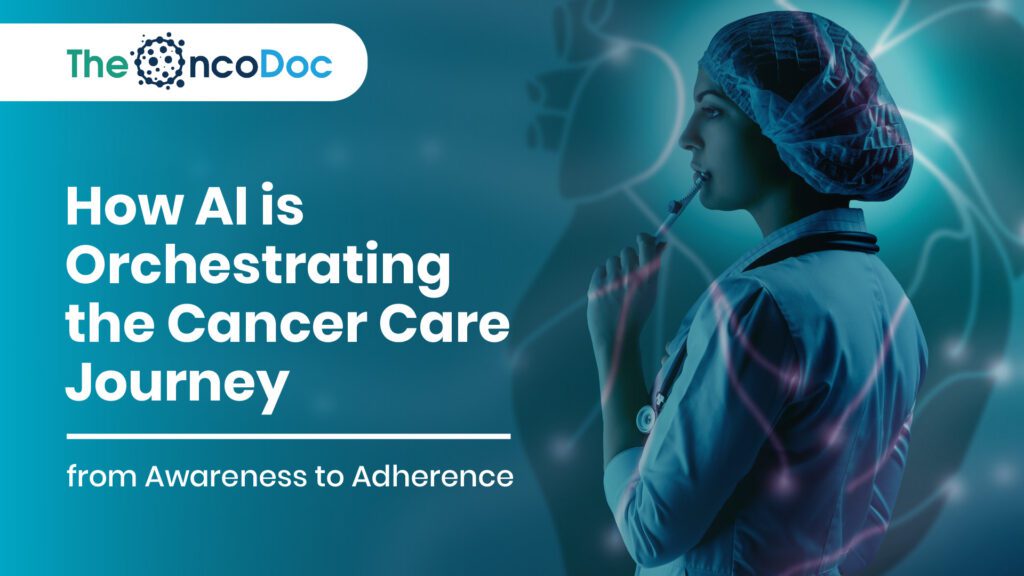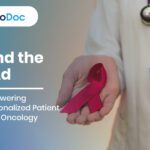Abstract
The cancer care journey is a complex, emotionally charged, and often protracted experience for patients, their caregivers, and healthcare professionals (HCPs). From initial symptom awareness and diagnosis to treatment initiation, adherence, and long-term survivorship, each stage presents unique challenges that can significantly impact outcomes. While groundbreaking advancements in oncology therapies have extended lives, their full potential is only realized when patients successfully navigate this intricate pathway. This article explores the transformative role of Artificial Intelligence (AI) in revolutionizing the entire cancer care journey, moving beyond traditional marketing to create intelligent, personalized, and supportive ecosystems.
We will analyze how AI is being leveraged across critical stages: 1) Enhancing Disease Awareness and Early Diagnosis; 2) Optimizing Treatment Selection and Initiation through Precision Insights; 3) Driving Adherence and Persistence with Personalized Support; 4) Proactive Management of Side Effects and Quality of Life; and 5) Empowering Long-Term Survivorship.
For each stage, this article will detail the specific AI applications, from predictive analytics and natural language processing to generative AI and machine learning, and illustrate their practical implementation within the US oncology landscape. We will highlight how pharma marketers, in collaboration with medical and patient support teams, can utilize AI to deliver targeted education, personalized interventions, and continuous support, thereby improving patient engagement, reducing disparities, and ultimately enhancing clinical outcomes. The discussion incorporates data-driven insights and hypothetical models to demonstrate AI’s quantifiable impact on the cancer care journey, offering a strategic roadmap for pharma managers to evolve their role from mere product promotion to genuine partnership in patient-centric care.
Introduction: The Unseen Gaps in the Cancer Care Continuum
The narrative of cancer care is often dominated by scientific breakthroughs – new drugs, advanced diagnostics, and innovative surgical techniques. While these advancements are undeniably critical, the journey of a patient with cancer is far more than a series of medical interventions. It is a convoluted pathway fraught with informational gaps, emotional distress, logistical hurdles, and the persistent challenge of adherence to complex treatment regimens. From the moment an individual experiences a subtle symptom to years into survivorship, every step is a potential point of failure where optimal outcomes can be compromised.
In the US oncology landscape, this complexity is amplified by a fragmented healthcare system, an explosion of medical information, and a diverse patient population with varying levels of health literacy and access to care. Pharmaceutical companies, traditionally focused on drug development and commercialization, are increasingly recognizing their expanded responsibility to support the entire patient journey. However, traditional marketing and patient support models often fall short in providing the personalized, dynamic, and continuous assistance required.
This is where Artificial Intelligence emerges as a game-changer. AI is not merely a tool for automating tasks; it is a powerful enabler for understanding, predicting, and proactively addressing the individual needs of patients and HCPs throughout the cancer care continuum. By moving beyond siloed interventions, AI can weave together disparate data points, personalize communications, and anticipate challenges, creating a smarter, more supportive, and ultimately more effective cancer care journey.
This article will embark on a comprehensive exploration of AI’s transformative role, stage by stage, demonstrating how pharma marketers, leveraging these intelligent technologies, can pivot from simply selling treatments to genuinely facilitating better care, from the earliest spark of awareness to sustained adherence and beyond.
Stage 1: Enhancing Disease Awareness and Early Diagnosis
The Problem
Early diagnosis is paramount in oncology; it often dictates prognosis and treatment efficacy. However, low disease awareness, misinterpretation of symptoms, and delays in seeking medical attention are persistent challenges. Marketing efforts traditionally rely on broad public health campaigns, which, while valuable, often lack the personalization needed to motivate individuals at risk or those experiencing early, subtle symptoms.
The AI Solution
AI can leverage population health data, behavioral science, and personalized communication to improve targeted awareness campaigns and facilitate earlier diagnosis.
- Risk Stratification and Targeted Awareness: AI models can analyze anonymized and aggregated real-world data (e.g., demographic data, public health records, geographic health trends) to identify populations at higher risk for specific cancers or those with known disparities in screening rates.
- Personalized Symptom Education: Generative AI and natural language processing (NLP) can create highly accessible, culturally sensitive, and language-appropriate educational content about symptoms, risk factors, and the importance of screening, tailored for specific at-risk groups.
- Digital Nudges for Screening: AI-powered digital platforms (e.g., patient portals, smart device integrations with consent) can deliver personalized reminders and educational content to individuals based on their age, risk profile, and last screening date.
Practical Application in Oncology Marketing
A pharma company supporting a lung cancer therapy might target regions with high smoking rates or occupational exposure.
- Campaign: AI identifies specific zip codes with a high prevalence of former smokers over 50.
- Content: Instead of a generic ad, AI-generated content (vetted by medical experts) delivers personalized messages about lung cancer symptoms and the benefits of low-dose CT screening, using testimonials from survivors from similar demographics, delivered via local digital media or community health platforms.
- Impact: Increased screening rates in targeted populations lead to earlier diagnoses, improving the likelihood of successful treatment.

Stage 2: Optimizing Treatment Selection and Initiation through Precision Insights
The Problem
Once diagnosed, oncologists face a daunting task: selecting the optimal treatment from an ever-expanding array of therapies, often based on complex molecular profiles and nuanced clinical guidelines. Patient factors (comorbidities, preferences) and logistical hurdles (insurance, access to specialized centers) further complicate treatment initiation, leading to delays and potential suboptimal choices.
The AI Solution
AI can empower oncologists with precision insights and streamline the treatment initiation process, ensuring the right patient gets the right treatment faster.
- Decision Support Tools: AI-powered clinical decision support (CDS) tools integrate patient genomic data, pathology reports, clinical history, and the latest treatment guidelines to suggest the most appropriate therapies, including clinical trial options. Pharma can support these tools through educational content and integration.
- Predictive Adherence Risk: AI can analyze a patient’s historical data, socioeconomic factors, and geographical information to predict potential adherence barriers before treatment even starts, allowing for proactive intervention.
- Streamlined Access Programs: AI can identify and navigate complex insurance requirements, patient assistance programs, and specialty pharmacy networks, reducing administrative burden and accelerating time to treatment.
Practical Application in Oncology Marketing
A pharma company is launching a new targeted therapy for a rare mutation in colorectal cancer.
- HCP Education: AI identifies oncologists likely to encounter this specific mutation (e.g., those using specific genomic testing labs) and proactively delivers detailed, personalized data on the new therapy’s efficacy and safety in that patient population.
- Patient Support Integration: AI flags patients who might face financial barriers, automatically connecting them to financial assistance programs or patient navigators.
- Impact: Reduced time from diagnosis to treatment, increased appropriate prescribing of novel therapies, and fewer delays in care.

Stage 3: Driving Adherence and Persistence with Personalized Support
The Problem
Poor adherence to oral oncology medications or consistent attendance at infusion appointments is a major challenge, leading to suboptimal outcomes, disease progression, and increased healthcare costs. Factors range from forgetfulness and side effects to financial toxicity and a lack of understanding of treatment benefits. Traditional adherence programs often lack personalization and fail to adapt to individual patient needs.
The AI Solution
AI provides hyper-personalized, dynamic adherence support that goes beyond simple reminders.
- Predictive Adherence Nudges: AI models continuously analyze patient data (e.g., self-reported symptoms, digital engagement with support materials, pharmacy refill data where compliant) to predict when an individual patient is at risk of non-adherence.
- Personalized Content and Reminders: Generative AI can craft highly personalized messages (text, audio, video snippets) delivered via preferred channels (e.g., secure messaging apps, patient portals), addressing specific adherence barriers. For example, if a patient reports nausea, the AI delivers tips for managing nausea, rather than a generic reminder.
- Virtual Coaching: AI-powered chatbots or virtual assistants can provide on-demand support, answer FAQs about medication, and triage urgent concerns to human support staff.
Practical Application in Oncology Marketing
A pharma company offering an oral oncolytic.
- Digital Adherence Program: Patients enroll (with consent) in an AI-powered program. If a patient misses a dose, the AI sends a gentle, personalized reminder. If they report a specific side effect via a symptom tracker, the AI provides tailored coping strategies and alerts their care team if needed.
- Caregiver Support: AI also identifies and supports caregivers, providing relevant information and resources as they navigate their role.
- Impact: Measurable increase in adherence rates, reduced treatment interruptions, and improved patient outcomes.

Stage 4: Proactive Management of Side Effects and Quality of Life
The Problem
Many modern cancer therapies, especially immunotherapies and targeted therapies, come with unique and sometimes severe side effects that can significantly impact a patient’s quality of life and even lead to treatment discontinuation. Early detection and proactive management of these adverse events are crucial but often delayed due to patients not knowing when to report symptoms or HCPs misinterpreting them.
The AI Solution
AI empowers patients and HCPs with tools for proactive symptom monitoring and management, improving safety and quality of life.
- AI-Powered Symptom Trackers: Wearable devices and patient-reported outcome (PRO) apps integrated with AI can continuously monitor symptoms, vital signs, and activity levels. AI identifies subtle changes that may signal an emerging adverse event.
- Alert Systems: When AI detects a concerning pattern, it can trigger alerts to the patient (with self-management tips) and their care team, allowing for early intervention before symptoms become severe.
- Personalized Side Effect Education: Generative AI can provide on-demand, personalized information on managing specific side effects, including dietary recommendations, lifestyle adjustments, and when to seek urgent medical attention.
Practical Application in Oncology Marketing
A pharma company is launching an immunotherapy with known immune-related adverse events (irAEs).
- Integrated Patient App: The company offers an AI-powered app that educates patients on common irAEs, allows them to track symptoms daily, and uses AI to analyze their input.
- Early Intervention: If a patient reports a persistent, low-grade fever and mild rash, the AI flags this to the care team, suggesting it might be an early sign of a specific irAE, enabling a prompt clinical assessment.
- Impact: Reduced severity of adverse events, fewer treatment discontinuations due to unmanaged side effects, and improved patient safety and quality of life.

Stage 5: Empowering Long-Term Survivorship
The Problem
As more patients survive cancer, the focus shifts to long-term survivorship, which involves managing chronic side effects, surveillance for recurrence, and addressing psychosocial needs. This stage is often fragmented, with patients transitioning from oncology specialists to primary care physicians (PCPs) who may lack specific knowledge about the long-term effects of complex cancer treatments.
The AI Solution
AI can facilitate continuity of care, provide personalized survivorship plans, and connect survivors to relevant resources.
- Personalized Survivorship Care Plans: AI can generate dynamic survivorship care plans that integrate treatment history, predicted long-term side effects (e.g., from targeted therapies), and recommended surveillance schedules, tailored to the individual. These plans can be shared between oncologists and PCPs.
- Ongoing Education for PCPs: AI can identify PCPs managing a significant number of cancer survivors and proactively deliver targeted educational modules on common long-term side effects (e.g., endocrine dysfunction post-immunotherapy) and best practices for ongoing surveillance.
- Resource Connection: AI can connect survivors to local support groups, psychological counseling, financial aid programs, and lifestyle coaching relevant to their specific long-term needs.
Practical Application in Oncology Marketing
A pharma company whose therapy has significantly increased long-term survival in a specific cancer.
- Digital Survivorship Platform: The company supports a platform where oncologists can input treatment data, and AI generates a personalized survivorship plan for the patient and their PCP, including recommended screenings, potential late effects, and symptom management advice.
- PCP Engagement: AI proactively pushes educational content to PCPs about managing long-term cardiovascular toxicities (if relevant to the therapy) to ensure continuity of care.
- Impact: Improved coordination of care, enhanced long-term quality of life for survivors, and reduced late-stage complications.

Conclusion: AI as the Navigator of the Cancer Care Labyrinth
The cancer care journey is a testament to both human resilience and scientific ingenuity. However, the full promise of modern oncology treatments can only be realized when every step of this intricate journey is supported, personalized, and intelligently navigated. Artificial Intelligence is emerging as the indispensable tool to achieve this.
For US pharma marketers, this represents a profound evolution of their role. Beyond simply promoting breakthrough therapies, AI empowers them to become genuine partners in improving patient outcomes by addressing the systemic challenges of the cancer care continuum. From raising awareness and streamlining diagnosis to enhancing adherence, managing side effects, and supporting long-term survivorship, AI provides the intelligence to deliver the right information, to the right person (patient or HCP), at the right time, through the right channel.
By strategically investing in and implementing AI across these five critical use cases, pharma managers can transform their engagement models from transactional to truly transformational. This shift will not only drive better marketing effectiveness and accelerate the adoption of life-saving drugs but, more importantly, will create a more humane, efficient, and supportive cancer care journey, ultimately leading to improved quality of life and extended survival for millions. AI is not just changing how we market; it’s changing how we care.
The Oncodoc team is a group of passionate healthcare and marketing professionals dedicated to delivering accurate, engaging, and impactful content. With expertise across medical research, digital strategy, and clinical communication, the team focuses on empowering healthcare professionals and patients alike. Through evidence-based insights and innovative storytelling, Hidoc aims to bridge the gap between medicine and digital engagement, promoting wellness and informed decision-making.



